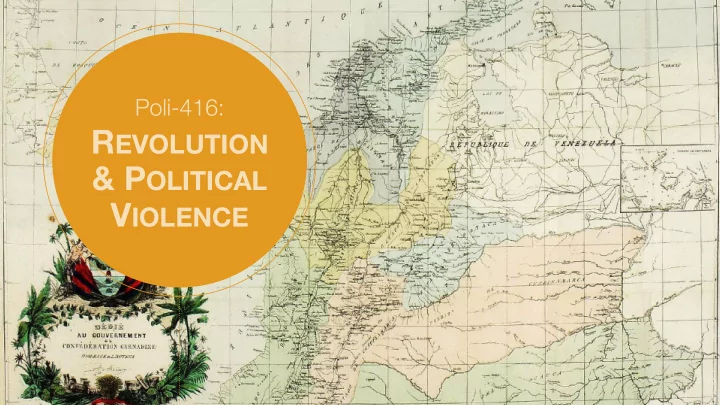

Poli-416: R EVOLUTION & P OLITICAL V IOLENCE
TODAY’S AGENDA 1 What is “identity” and when is it salient? 2 Colonial legacies 3 Cockburn in Iraq
The Conflict in Northern Ireland English have weak control of Ireland for centuries 1600s: Dispossess Irish (Catholics) and give land to English/Scottish Protestans in Ulster , violence follows 1916: Easter Rising, Irish Republicans seeking independence
Partition 1920s: Ireland gains independence But Ulster to remain with England, and thus Northern Ireland is born
Life in Northern Ireland for Catholics Catholics in Northern Ireland face discrimination: - Housing - Jobs - Voting - Police Organize movement modeled after African-American civil rights movement (1960s)
The Troubles Series of shootings, riots, bombings in Northern Ireland Provisional Irish Republican Army (IRA) Ulster Defense Force and Ulster Volunteer Force 3,500 people died
Good Friday Agreement 1998 agreement brings end to conflict Changes to government, civil rights legislation Peace walls in Northern Ireland
End of conflict (?) Brexit isn’t helping
Identity and its salience We all have identities that link us to broader communities The extent to which one (or more) is particularly important to us is its salience How do identities become more/less salient ?
Identity Salience and Grievances Is being a minority in a multi-group country enough? Political and economic exclusion or discrimination
Not just the poor But also when there’s benefits to making group-level demands Catalonia Santa Cruz department in Bolivia wealthiest part of Spain ~30% of National GDP
In General “Competition for resources can heighten ethnic tensions for both more prosperous groups, who may desire to secede to insulate themselves from the redistributive demands by others , and less prosperous groups, who may prefer [redistribution] ” Lake (2017)
Identity salience and competition In Nigeria Herders : mobile cattle-ranchers, need to graze Farmers : stationary, need land for crops Laws banning grazing in the North, violence, & bad climate have pushed herders South
Land Conflicts and Violence Herder accidentally (or maybe not?) grazing on farmer land Sporadic fights, murders as herders graze on farmer’s land But today we see planned attacks and militias Land conflicts have turned into a Christian vs. Muslim thing, why? Herders tend to be Muslim Farmers tend to be Christian
The Security Dilemma in Nigeria Rumors of scattered cases of herders , from the North , killing farmers Government absent How do farmers respond? Organize, arm for self-defense with other Southern farmers How is this perceived by herders? Outcome : mobilized and armed groups along ethnic lines
Barry Posen on The Security Dilemma & Ethnic Conflict Under state of anarchy (no state), groups have to provide their own security Groups take steps to protect themselves This is perceived as threatening to other groups; no way to signal defensive intentions The security dilemma What you do to improve your security creates reactions that, in the end, Make you less secure
Why groups? And why ethnic groups? Proposal end of semester I rescale pop-quizzes so top student gets 10/10 Example: in December, top student has 8/10 —> +2 for everyone What is your optimal strategy here? Barriers to optimal strategy? Alternative: I rescale within frat/sorority Which is easier? Why?
What do groups get you? Households = want to rent landlords = rent homes, pick price chiefs = adjudicate disputes Finding When household and landlord belong to different tribes Household pays higher rent Satellite imagery of Kenyan slum Why not discriminate against “own kind”? Stoker et al (2014)
Why groups? Information Ethnic categories provide basis for commonality, social networks Reciprocity of good behavior and sanctioning of “shirkers” easier within groups Ease of identification , harder to hide or mimic (but notable exceptions) Lower barriers to collective action
Fueling Tensions: Colonialism Scramble for Africa Yinka Shonibare
Nigeria British empower Hausa at expense of Yaruba and Igbo Biafra War: Igbo pursue independence Dramatized in Half of a Yellow Sun
Belgians in Rwanda Germans and Belgians empower Tutsi at expense of Hutu based bizarre “race science” Brutal independence war in 1960s Genocide of Tutsi, Twa by (mostly) Hutu group in control of army
Colonial legacies Why empower one group? Why so often a minority group? Prevent coordination and enhance divisions “Divide and conquer”
The effects of colonial rule The English The French Cultural assimilation Cultural assimilation (Not really, (French taught in school, French history) Only elites) Centralization of authority Decentralized rule (Disempower local elites, replace with French (allowed local elites to remain, bureaucrats) Serve as intermediary between state and subject) Which countries experienced more conflict after independence? Why?
Colonial style Ex-English colonies more likely to experience conflict and have worse conflict than ex-French colonies English colonies: old elites retain power, able to mobilize for war after independence French colonies: old elites gone, groups unable to mobilize
Cockburn on Regime Change in Iraq Journalist who lived in and reported from Iraq, Afghanistan, Syria, post- invasion Age of Jihad Diary from his time there, great book Angry, sarcastic old man
Regime Change in Iraq How did colonial rule impact Sunni- Shi'a relations? Who did the British put in charge? Why? How did Saddam manage these tensions? Sunni, Shi’a relations: always bad? What would happen if elections held? Why didn’t the US want this? How did US occupation exacerbate tensions?
Stoking the flame Strategic actors actively inflame ethnic tensions Anti-occupation insurgents largely Sunni Al Qaeda in Iraq (AQI) actively targets Shi’a Shi’a militas form, reprisals Massacres, torture, executions, Ethnic cleansing in Baghdad VBIEDs
Next week No class Tuesday But there’s reading
Recommend
More recommend